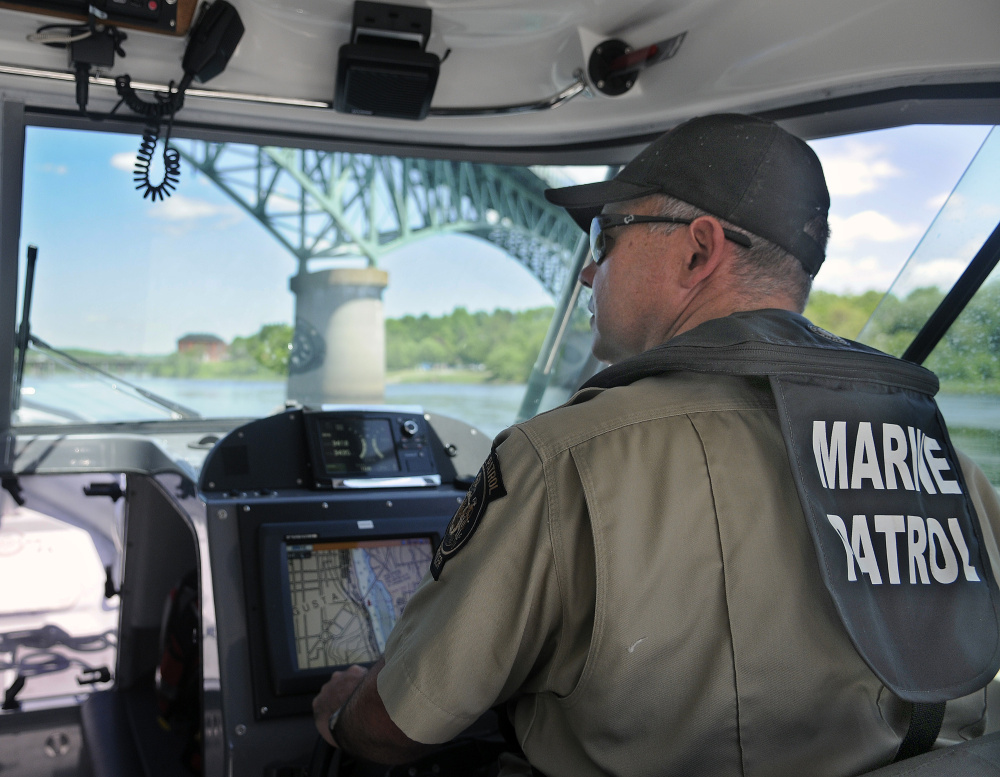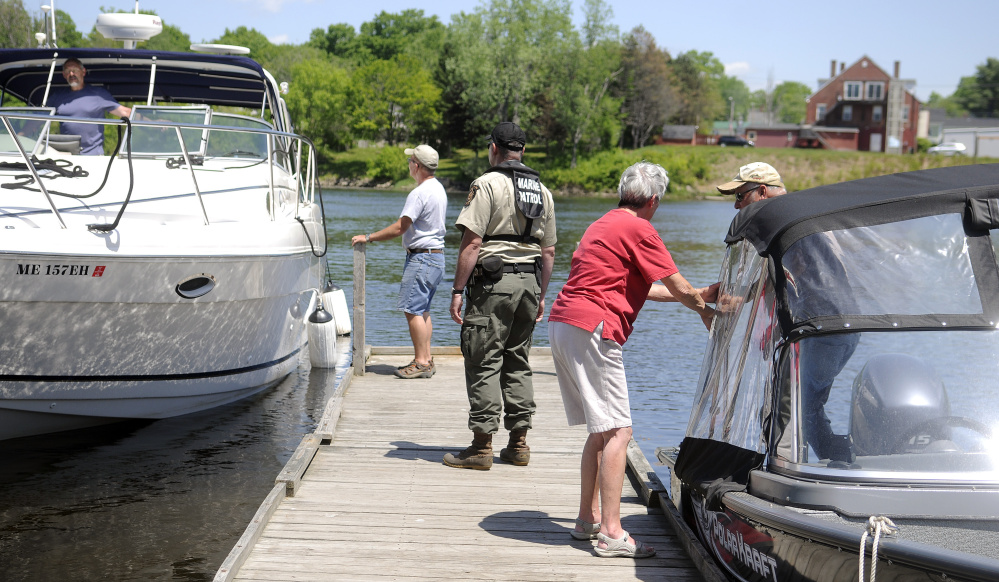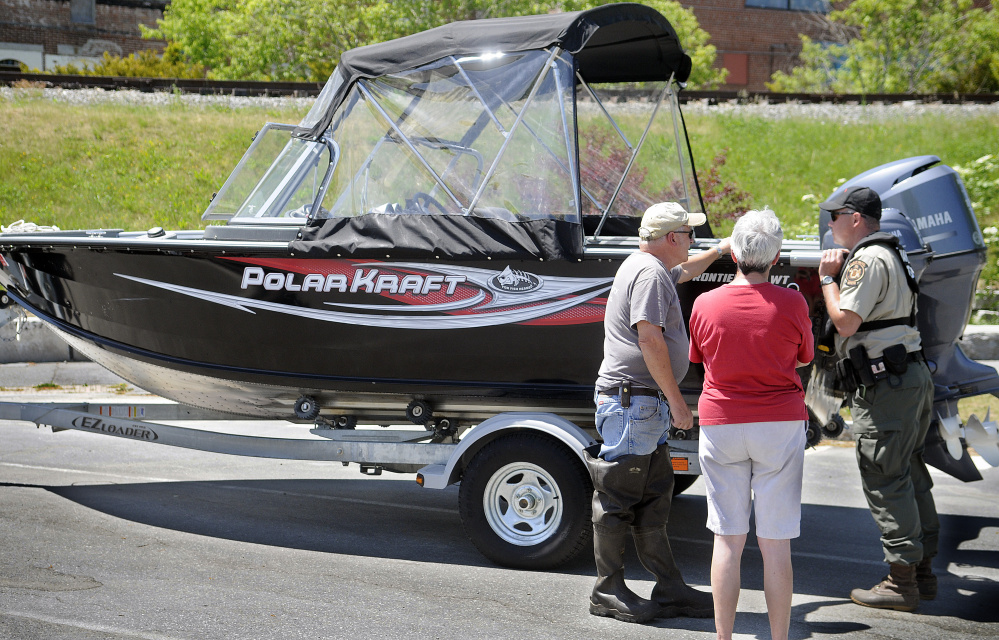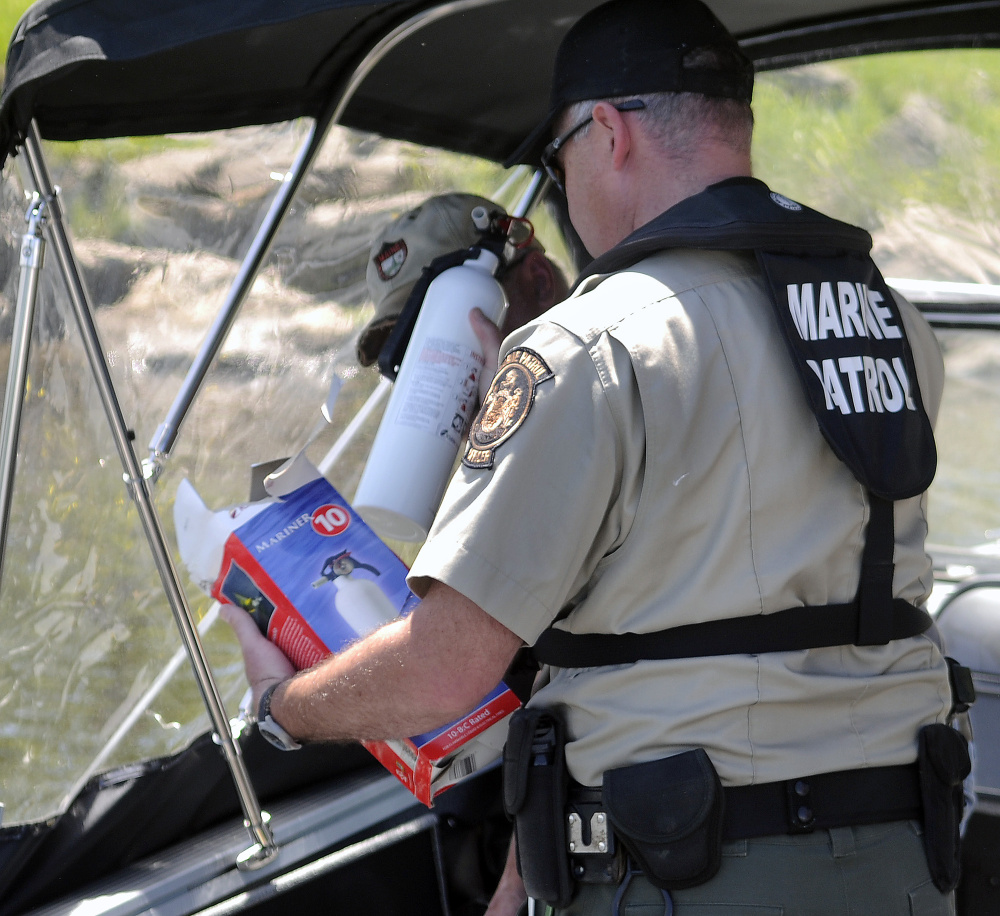The start of boating season is a celebratory time for many Mainers. But tempted as boat owners might be to dust off their vessels and hit the state’s waterways without a second thought, authorities are urging boaters to use caution and brush up on the rules of the water.
One of those authorities is Officer Clint Thompson, of the Maine Marine Patrol, the law enforcement organization that covers all the state’s coastal and tidal waterways. The tidal zone comes all the way up the Kennebec River to Augusta.
On Tuesday morning, Thompson was patrolling the capital area, checking with all the boaters he could find.
“We’re just trying to get the word out that we want people to be thinking about safety when they’re recreationally boating,” Thompson said. “We want it to be fun, and we don’t want there to be any tragedies.”
The Memorial Day weekend marked the unofficial start of the boating season, Thompson said, and plenty of boaters did make the most of the holiday. Saturday was a particularly busy day on the Kennebec, and Thompson said more than half of the boaters he checked had all the necessary safety equipment. Only in a “small handful” of cases did Thompson issue warnings to people who didn’t have the required safety gear, he added.
But even this early in the season, there has been tragedy on Maine’s waterways, too.
On Saturday evening, a man from the York County town of Shapleigh died after falling from a 17-foot motorboat that was operated by his twin brother, then getting run over by the boat, according to the Maine Warden Service, which enforces laws on the state’s inland waterways.
The brothers were on Mousam Lake at the time, and Jeff Beattie, 31, was riding on the bow of the vessel when he fell. They were accompanied by their spouses and a friend. The warden service and the York County District Attorney’s Office still were investigating the causes of the accident early this week and had submitted a blood sample for drug and alcohol testing.
Such incidents aren’t unprecedented in Maine, where a couple of dozen recreational boating accidents have been reported in each of the last few years for which data is available. In each of those years, alcohol also has played a role in a handful of accidents.
In 2014, the U.S. Coast Guard recorded 35 boating accidents here, resulting in five deaths and 14 injuries. Alcohol was a factor in five of those accidents, two of which were fatal.
There were more accidents recorded a year earlier in 2013 — 54, resulting in four deaths and 35 injuries — but alcohol was a factor in just three, none of which was fatal.
Numbers were not immediately available for 2012, but in 2011, there were 48 reported accidents resulting in 12 deaths and 26 injuries. Alcohol was reported as a factor in six of those, four of which were fatal.
To prevent such accidents, Thompson, the marine patrol officer, says that no one operating a boat should consume alcohol.
While possession of alcohol is allowed on watercraft, recreational operators can be charged with operating under the influence, a class D crime, if their blood-alcohol level is 0.08 percent or higher, the same as the limit for noncommercial car drivers.
Along with monitoring for alcohol use, Maine Marine Patrol officers also check to make sure boat operators have a variety of safety devices on board.
Under Maine law, boaters are supposed to have one life jacket for every person on board. The Marine Patrol requires that children under the age of 11 wear life jackets, and it recommends that other passengers do as well, Thompson said. Violators of that law can face fines of $100 to $500.
While such flotation devices might seem unnecessary to some operators or passengers, Thompson said that kind of attitude defeats the purpose of the life jacket.
“You never plan to go in the water. It’s always a surprising event,” Thompson said. “Even if you’re a good swimmer in the water, you may find yourself unprepared, or you may be injured if you hit your head or hit your leg.”
Some boat operators also are required to carry fire extinguishers, lifesaving rings and a sound-producing device such as a whistle or horn. As for planning, Thompson advises boaters to check the weather and their itinerary before hitting the water and to be courteous around other boaters.
“Recreational boating is supposed to be an enjoyable activity,” he reiterated. “We hate to see it turn to tragedy.”
Charles Eichacker — 621-5642
Twitter: @ceichacker
Send questions/comments to the editors.







Success. Please wait for the page to reload. If the page does not reload within 5 seconds, please refresh the page.
Enter your email and password to access comments.
Hi, to comment on stories you must . This profile is in addition to your subscription and website login.
Already have a commenting profile? .
Invalid username/password.
Please check your email to confirm and complete your registration.
Only subscribers are eligible to post comments. Please subscribe or login first for digital access. Here’s why.
Use the form below to reset your password. When you've submitted your account email, we will send an email with a reset code.